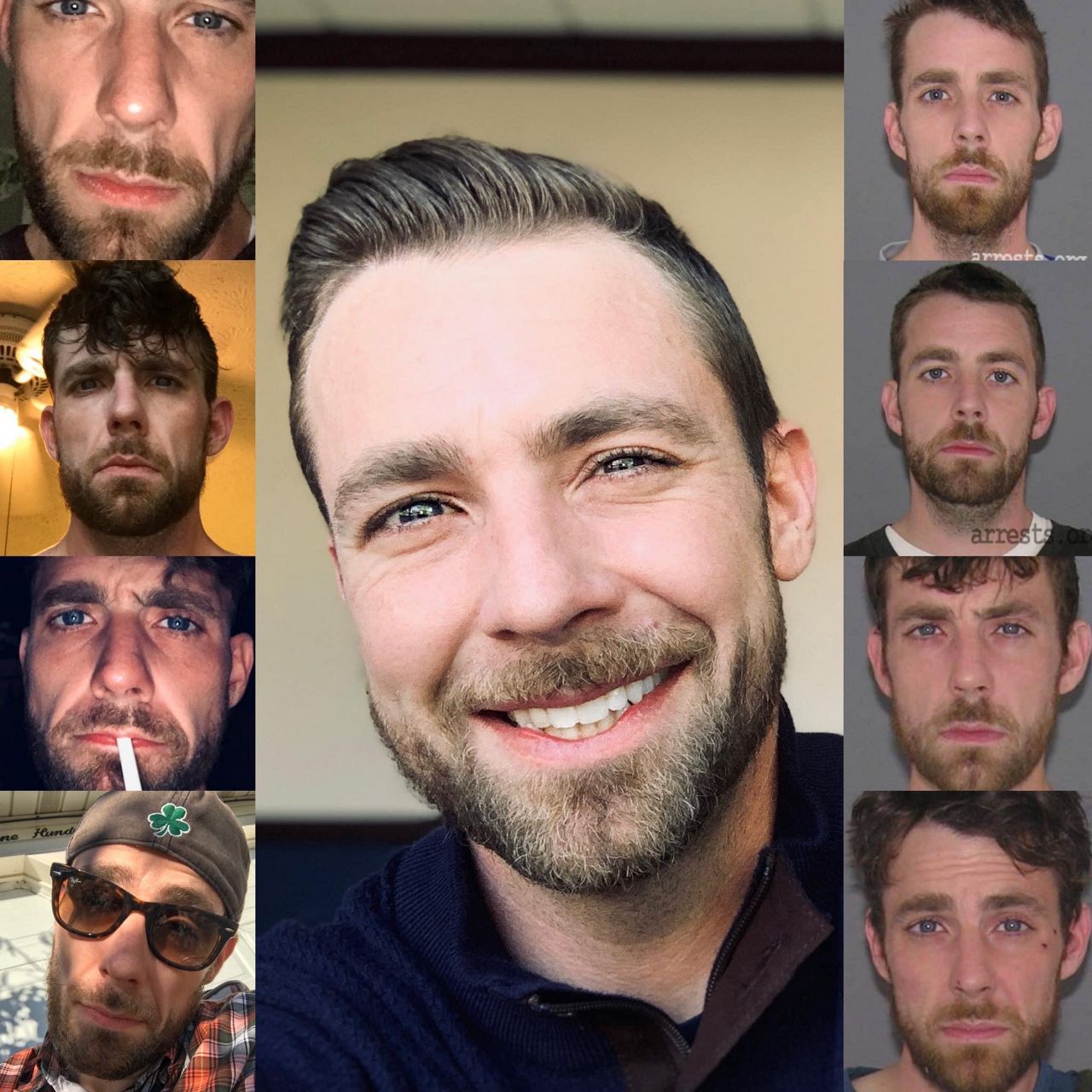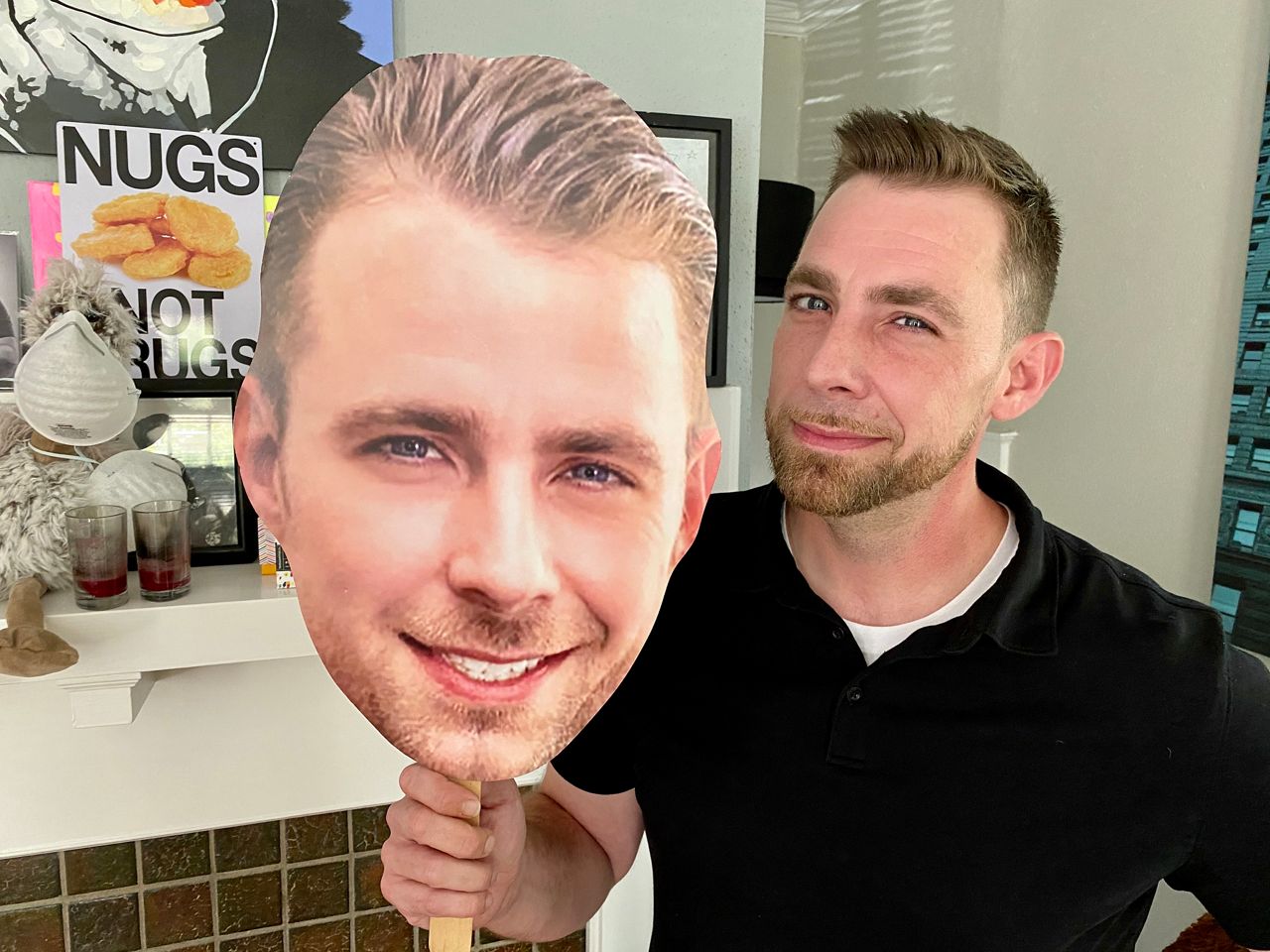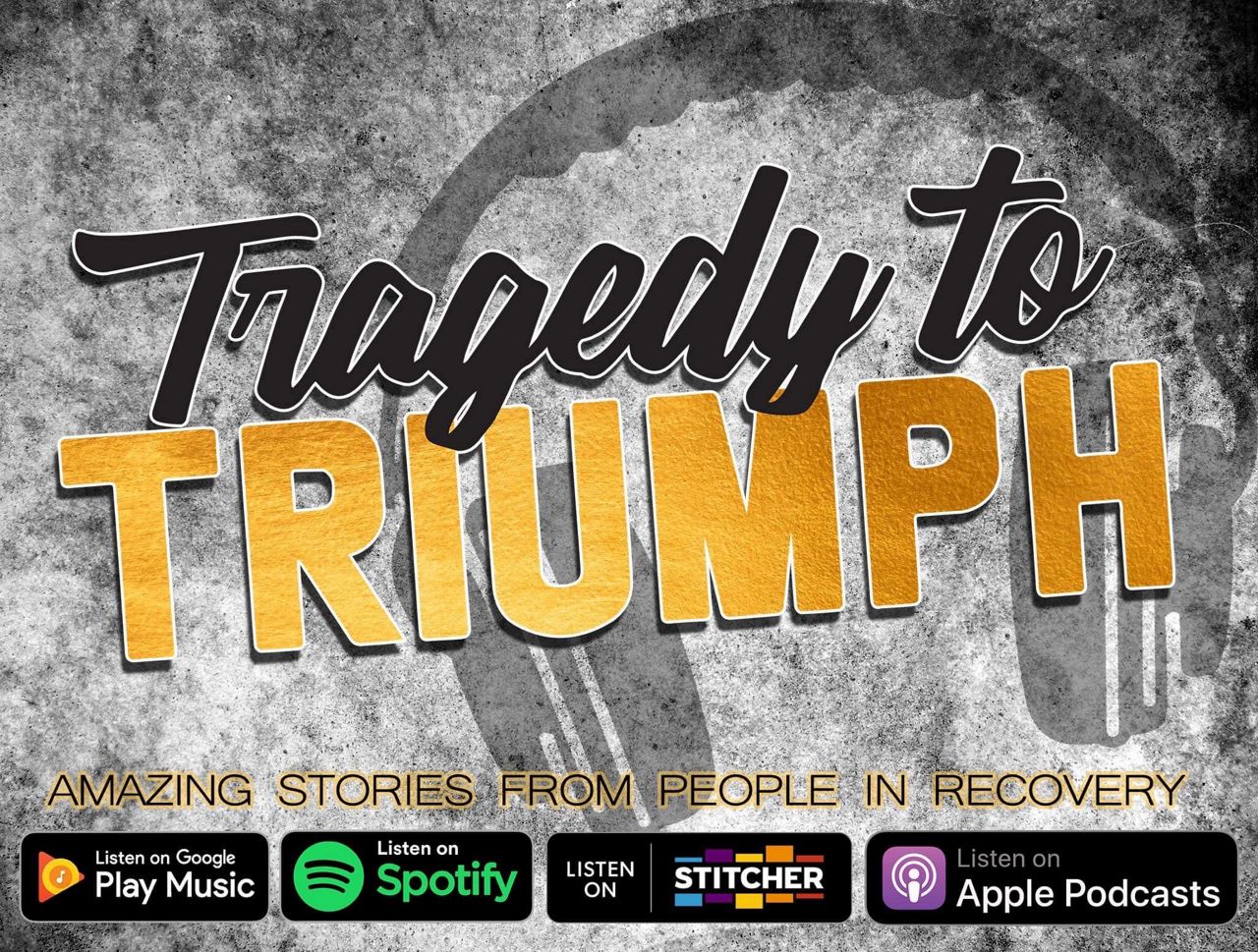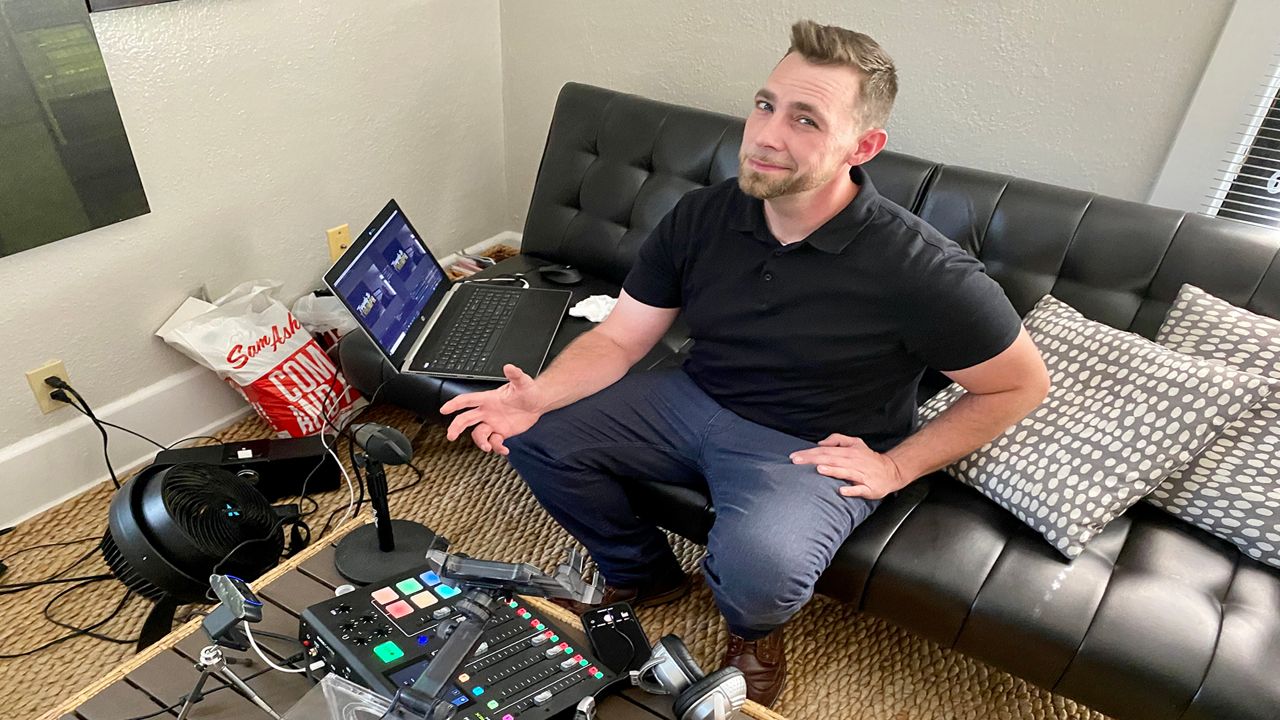Editor’s Note: Aaron Laine's story is the second in the three-part series, “The Other Side of Addiction.”
CINCINNATI — Aaron Laine stole money from his 8-year-old daughter’s piggy bank.
"I walk in on her and she's sitting Indian-style with this piggy bank in her lap. And she's sobbing. She's like, 'I don't know how this happened,’” he recalled. "I felt like an absolute piece of shit. And I wanted to cry or say, 'I'm so sorry.’"
But, he said, he couldn't.
The 38-year-old father of three daughters gets emotional when remembering that day. The day that his teary-eyed little girl looked up into her daddy's eyes him, asking him where her money was. And he lied to her so that he could use the money she had saved to get high.
“It's just, she's a little girl. She's so innocent,” he said.
There are many moments in his life during his addiction that Laine isn’t proud of, or when he hit a low point, but the day that he stole from and then lied to his daughter, was certainly one of his lowest.
He could apologize a thousand times to her, to others he had stolen from or wronged in other ways, but the best apology he could give, he said, was a change in his behavior.
Today, he helps others navigate on their road to recovery — but it wasn’t long ago when he was finding his own path to sobriety. He has been in recovery for four years, but it was a long, hard road.
When he was younger, he said, he dabbled with alcohol and smoked marijuana.
"I had always enjoyed drugs and alcohol. I liked to party a bit but within reason. I had experimented over the years, like, you know, going to drink after work or on the weekends and having a good time,” said Laine, who was born and raised in Cincinnati.
But when he was 18 years old, he suffered a back injury while he was a bar back carrying kegs. In addition to that chronic pain, he had been suffering from migraines since the second grade, he said.
When he was 19 years old, he started abusing Ritalin, he said.
But as his chronic back pain and migraines persisted, his doctor prescribed him opiate pain medication, from Vicodin to Percocet to OxyContin, when he was 25 years old.
“From that, that snowballed. We're increasing the dose, the frequency, and then withdrawal from those not understanding what it was, and trying to work and trying to balance, a growing substance use disorder, to the point where it just grew out of out of control,” he said. “That snowballed into the most insane point of my life.”
By 28, he was addicted and started using heroin and cocaine. Then, he added methamphetamines and fentanyl to the mix, which, he said, nearly killed him several times over six years.
And for the next decade, he said, he was a "slave to addiction,” overdosing five times.
Addiction for him, felt like “wanting to control something that was out of my control – and trying to find ways to make that happen. It's a very selfish place to be,” he said. “Using quiets this voice in our heads that tell us we're not worth shit — at least, it did for me. And I was always searching for that voice to stop, for that pain to stop. And that's what it was, like the constant pursuit and this balancing act to keep that going.”
And soon, he would lose control of that balancing act and wind up in jail.

In 2009, he was arrested for the first time for possession and went to treatment.
Three years later, he was arrested again and charged with two felonies for possession — and again, in 2014, and in 2016. He was in and out of addiction recovery and treatment centers nine times over those years.
But 2016, he remembered, was the worst year of his life.
He had open arrest warrants for him when the police came knocking on his mother’s door while he was living with her that December. He hid in her closet.
But when the police found him, he was put into handcuffs and had to look into his mother’s eyes and feel shame and guilt.
While this had been a turnstile for him over the years, in and out of jail and treatment, and back out getting high, this time, the judge was willing to give him one more opportunity to try treatment again.
He admitted that he really didn’t believe, or have any ounce of hope that this time would be any different than the many times he had gone through treatment for his addiction in the past.
But this time, he was wrong. Everything would change.
In February 2017, while in treatment, he woke up to a phone call from his wife. She wanted to tell him that she had, had enough and that she wanted a divorce, and to tell him that his brother had killed himself.
“It was like a double punch,” he remembered. "My brother's dead, my marriage is over, like, there is no going back to try and fix it. I can't be there for anybody."
He felt helpless and hopeless, he said.
Later, in the middle of the night, he found himself staring at his own reflection as the tears stream down his cheeks.
“I'm in the bathroom and I'm crying and I'm crying. I'm looking in the mirror and I'm saying, 'Aaron, you're a piece of shit. You're worthless. You're never going to get your kids.’”
A security guard walked by as he was spouting nasty remarks to the man staring back at him in the mirror, and told Laine to go to bed.
He stomped off and went to his room. Lying in bed, Laine said he threw some headphones on and started listening to the radio, trying to drown out everything. That is when a song started playing and the he listened closely to the words.
The song, “Priceless,” by for King and Country came on the radio while Laine was sitting inside the treatment center.
It is a moment of clarity he will never forget.
The words not only resonated with him, they pierced him. He said, he heard God speaking to him — a divine intervention, he surmised.
“The song starts off by saying, ‘Mirror, mirror on the wall, telling those lies pointing out your flaws. It's not who you are… It’s late at night; you're wide awake, too much to take. But don't you forget that through your pain, you can be brave. And I see you dressed in white, like it's the middle of night, wearing a white T-shirt…’”
As he listened, he was getting goosebumps, he said.
The song went on, “Every wrong made right. I see a rose in bloom at the sight of you… Oh, so priceless.”
“That was the day my recovery began,” he said.
It was that spiritual experience with the radio and God, he said, that gave him the motivation to be on the radio himself. And with that, he had a goal and a mission — to use his voice.
“I told my kids, ‘Your dad's gonna get into radio in a year.’”
Laine found recovery in 2016 and knew what he wanted to do with his life. He wanted to be a DJ on the radio. So, after recovery, he enrolled in broadcasting school.
For him, recovery has been beautiful and eye-opening.
“Recovery has a way of changing us for the better, sometimes quickly and sometimes slowly, but it will always work, if we work for it,” Laine said.

Now, a full-time DJ, Laine started another on-air venture. This time, with a recovery twist.
His podcast, “Tragedy to Triumph,” which he launched in 2018, allows him to use his voice in another way, he said — to inspire others and advocate for those who are still struggling with addiction. But, it also continues to inspire him, he said. It helps him to stay sober, he revealed, by helping others, and seeing and understanding the human side of addiction through others’ stories.
Furthermore, he wants to help change the narrative and the stigma surrounding addiction and talk more freely about it through his podcast and through open dialogue and speaking engagements at meetings and recovery and treatment centers.
"By doing that podcast, I get to meet people that are in recovery (and) it expands my concept. My own story is therapy,” Laine said.
“Tragedy to Triumph” features guests who share their own stories of hope as well as resources for those in need of more than hope. Guests like, Hamilton County Addiction Response Coalition founder and Newtown Police Chief Tom Synan.
Laine never thought in a million years that he would ever befriend a cop, he said. But now, he could not imagine his life without “Batman.”
Synan has been dubbed as the superhero for quite some time through his work in law enforcement. But until Laine met him, he didn’t have a Robin.
"People have been calling us that for a while, and I've been joking with him, like, ‘If you're Batman, that makes me Robin,'” Laine laughed.
They met when Synan was speaking at an addicted loved ones conference, Laine recalled.
Laine has never been arrested by Synan, but he appreciates and respects him and his position because of their friendship.
“He's helped normalize the law enforcement position,” he said, explaining that Synan is the voice of reason for him.
Because of that, he has realized at least one thing about police officers.
“They don't want to deal with knuckleheads every day. They want people to get better,” Laine said.
“Tom is in a great position to utilize his platform to give validity to the voices of other people and himself, and from that angle, and plus with law enforcement,” he said. “He helps amplify the right voices. He helps amplify the voices of people who should be able."
"And he’s just cool. Yeah, we’re friends,” Laine chuckled, throwing his hands up.
It’s that connection and that friendship, he said, that gives him another source of inspiration and another voice to connect to others in recovery in his community — helping them get to the other side of addiction.
“You just have to utilize what you're given. And this is what I was given. I'm gonna make the most of it. Because I also want to see how far we can take this,” Laine said. "I live here; (Tom) lives here. How can we grow that? How can we impact more people that are here? Can we can unleash change our community?"

“For me having the job working in broadcasting, working in treatment, being a recovery advocate, are all a direct result of my addiction. It's all a result of everything, all the ugly stuff, all of the shooting dope in a parking lot, and stealing from my family, all of those things, that allowed me to be here today. Not everybody is that lucky — some people lose their lives in the process, and I don't ever forget that,” he said.
Being on the other side of addiction for Laine, means a lifelong journey and taking one day at a time with grace, hope and accountability, as well as taking in every inspiration along the way.
And for him, being the best father to his daughters is his biggest inspiration to stay sober. In fact, he said, being a good dad is his greatest accomplishment in life.
“My kids are like, my biggest cheerleaders. They are hugely supportive,” he gushed.
And with their love and support, his journey to the other side of addiction, he said, has made him who he is today and he is forever grateful.
“Recovery is… it's just beautiful. It's eye-opening,” Laine said.
While his future is unknown, he wants to keep moving forward to the next adventure.
“You don't know what's gonna happen next… It's like this constant surprise,” he said. "I feel like recovery is a superpower, flat out. I really do, and I kind of wish that everybody could experience it, even if it's not about drugs. It's about a way of life and the service of others and the way that things connect."
"I'm just hoping to continue to ride this wave as long as I can… just enjoy for what it is. I hope that future allows me to, you know, it's already given me all the things that I feel like I lost and then some,” Laine said. “I never want to go back. Life it’s too good on the other side.”
These days, Laine is living his dream working as a DJ at 96 Rock, as well as helping others in recovery through DeCoach Rehabilitation Centre as a regional director of community outreach.
If you need help with an addiction or know someone who does, Laine can be reached at alaine@decoachrehabctr.com.
For addiction and recovery services, visit https://www.hamiltoncountyohio.gov/government/open_hamilton_county/projects/addiction_response_coalition.
